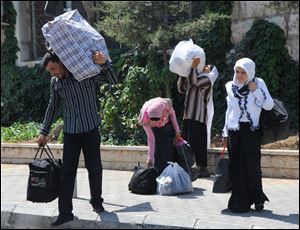
Thousands head for Lebanon to escape battles in Damascus
7/21/2012
Syrians cross into Lebanon at Masnaa, about 25 miles from Damascus. Refugees arrived at the border Friday in buses, taxis, and private cars, joining the flood who have fled in the last 48 hours.
BEIRUT -- Thousands of people were fleeing Damascus, the Syrian capital, and heading to Lebanon on Friday, according to the U.N. refugee agency.
Rebels were describing the fighting as the bloodiest of the 17-month uprising.
Between 8,500 and 30,000 Syrians have crossed into Lebanon in the last 48 hours, a U.N. agency spokesman, Melissa Fleming, said.
The flood adds to an exodus of more than 112,000 who had registered as refugees in Lebanon, Turkey, Iraq, and Jordan -- and many thousands more who had fled but not registered.
U.N. relief agencies say three-quarters of them are women and children. They often arrive in a desperate state with no more than the clothes they are wearing.
As many as 1 million people have been displaced within Syria, according to the Syrian Arab Red Crescent.
On Friday, government forces in Damascus claimed to have retaken a pocket of the city. The day before, rebel fighters seized all four border crossings with Iraq and one into Turkey. The rebels were building on the momentum they gained by the brazen assassination of top security officials Wednesday.
Syrian state television reported that a fourth member of President Bashar Assad's elite circle -- Gen. Hisham Ikhtiyar, the head of security -- had died of wounds from the bombing at a security building.
The attack also killed Assef Shawkat, the president's brother-in-law and a senior security official; the defense minister, Gen. Dawoud Rajha; and Maj. Gen. Hassan Turkmani, a former defense minister. All were key to the government's efforts to stamp out the insurgency.
A public funeral for the first three victims was held Friday in a military ceremony on Qassioun Mountain, which overlooks Damascus, according to state television.
Syrian state media and the Syrian Observatory for Human Rights, based in Britain, said government forces had retaken a section of the Midan neighborhood Friday.Rebels said they withdrew to expand their guerrilla war.
The rebels pressed their fight deeper into the capital Friday, ambushing troops and attacking police stations. The two-day death toll was more than 470 people.
The fighting has shattered parts of Damascus. Rebels attacked at least two police stations. Government troops pounded rebel districts with mortars, machine-guns, and attack helicopters.
The clashes echoed those elsewhere in Syria; the lightly armed, disorganized rebels avoided direct battles with better-equipped government troops while launching ambushes on their convoys and checkpoints.
The regime has deployed overwhelming firepower, shelling from afar and sending attack helicopters that rebel weapons cannot reach.
"We often make tactical retreats so that there is no face-to-face confrontation," a rebel named Mohammed from the Eagles of Damascus brigade said via Skype. "It's like gang warfare. We pull out so we can hit in a different place or plan an attack on a regime checkpoint."
Like most rebels, his group has only assault rifles and rocket-propelled grenades. Without long-range weapons, the rebels are helpless against government shelling and helicopter strikes. They also lack ammunition.
"If we had all the ammunition we needed, we would have liberated the capital in two days," said Mohammed of the Eagles of Damascus brigade.
At the United Nations Friday, the U.N. Security Council voted to extend the mission of some 300 observers in Syria for 30 days. The U.N. suspended the observers' patrols and most other activities June 16 because of increased violence. The force's mandate was to have expired Friday.
Syria's unrest began in March, 2011, when protests calling for political change met a violent crackdown.